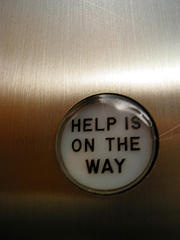
My neighbor has OCD–a fact I just recently learned. For the
longest time I believed she simply hated me, or that she thought I was a
psycho, and here’s why: she wouldn’t get
on the elevator with me. We’d wait together by the elevator bank, the
little indicator light glowing silently between us, and when the doors opened, she wouldn’t move to get on. (After a
few rounds of this, I’d even–discreetly–sniff my pits, but no, I hadn’t
neglected my deodorant.) Then I noticed that she would sometimes ride downstairs with me, but other times not. “Weird,”
I thought. “What is up with this
lady?”
Finally, I asked around, and learned about her OCD. I found
out she had a mental block about one particular
elevator (our building has two) and that her compulsions wouldn’t allow her to
ride the right one, though she could take the left. Since then, I’ve begun to
notice other behaviors my neighbor struggles with daily. She’s got a number of unfortunate, even disabling tics, and I can see it’s hard for her to get
around the neighborhood. She has to walk to the corner store a certain way, must perform certain
rituals when she’s opening or closing doors, can only wear certain clothes. I feel great sympathy when I see her.
But do I reach out? Not really.
I’m torn about my responsibility here. On the one hand, she seems extremely skittish, easily startled, riddled with anxiety. When I see her in the hallway, throwing out the garbage or heading to the laundry room or whatnot, I make an effort to move slowly, greet her gently but audibly (she’s got some vision and hearing problems). I want her to be aware of my presence so that she’s not afraid and can make whatever accommodations she needs to make for her comfort. When I see that she’s having a particularly bad day, caught in her rituals of button-pressing or pacing, my heart goes out to her, but the truth is, I don’t ask if I can help. Instead, I give her a wide berth at such times. I’ve even been known to take the service elevator or wait to leave my apartment in order to avoid her.
Why? Two reasons. One, I honestly don’t want to get involved. That’s the squeamish, selfish truth–or part of it, anyway. My other reason is less awful, and hopefully, more ethical: I respect her privacy. From what little I understand of the disease, Obsessive-Compulsive Disorder is all-consuming and frustrating, sometimes humiliating. It’s a massive struggle just to do little everyday things. I imagine that she doesn’t want attention called to her in such moments. I imagine that if I interrupted her counting rituals, she’d be stuck starting over, simply worsening her situation. And I take into account the fact that, any time I’ve been cautiously friendly, she’s reacted with a timidity that makes me think she’d rather be left alone.
But I don’t really know that.
I wonder the same thing about blind or disabled people I see on the street or on the bus or subway. Should I be offering assistance? Mostly I just make room for them, clear a path, but I say nothing, make no move to help. Would a word here or there be welcome? Or be considered insulting, interfering, or even an attack?
What’s the ethical thing to do in these situations? Anyone have a story they’d like to share?

